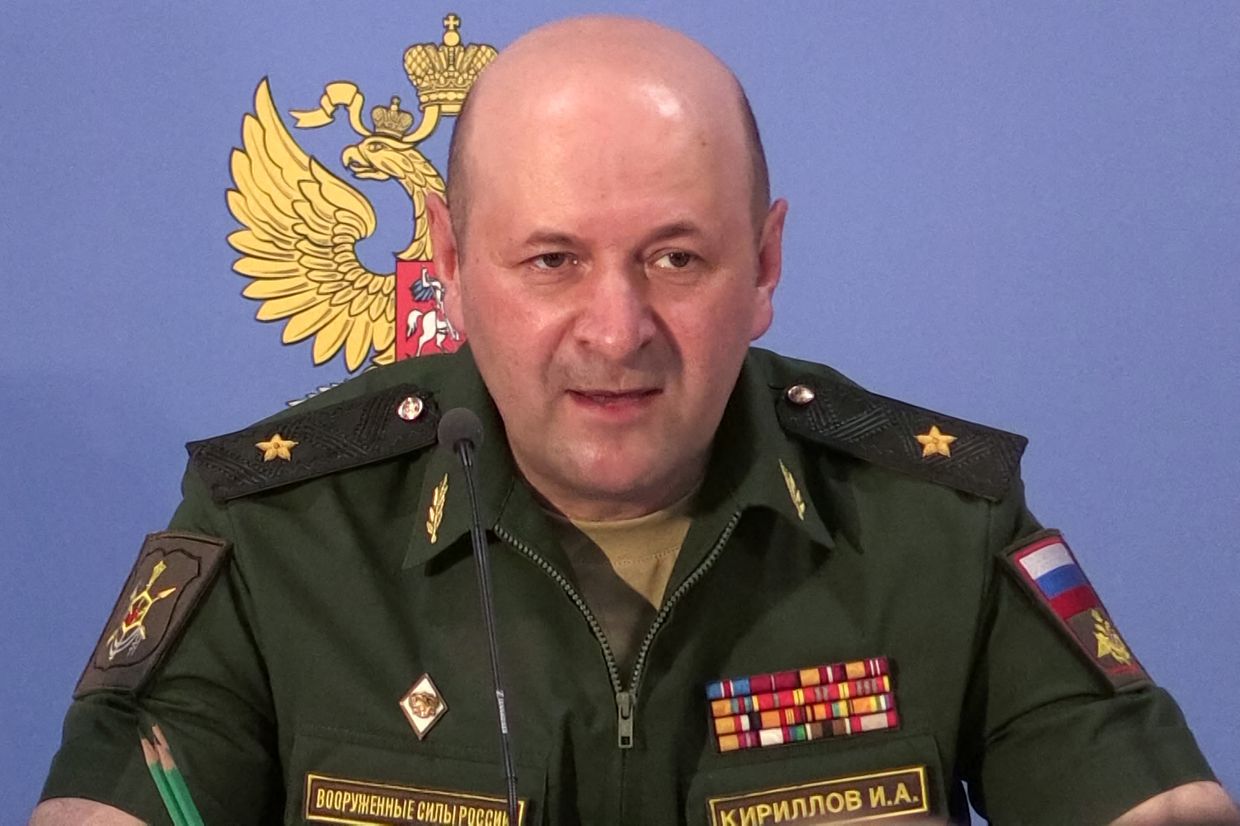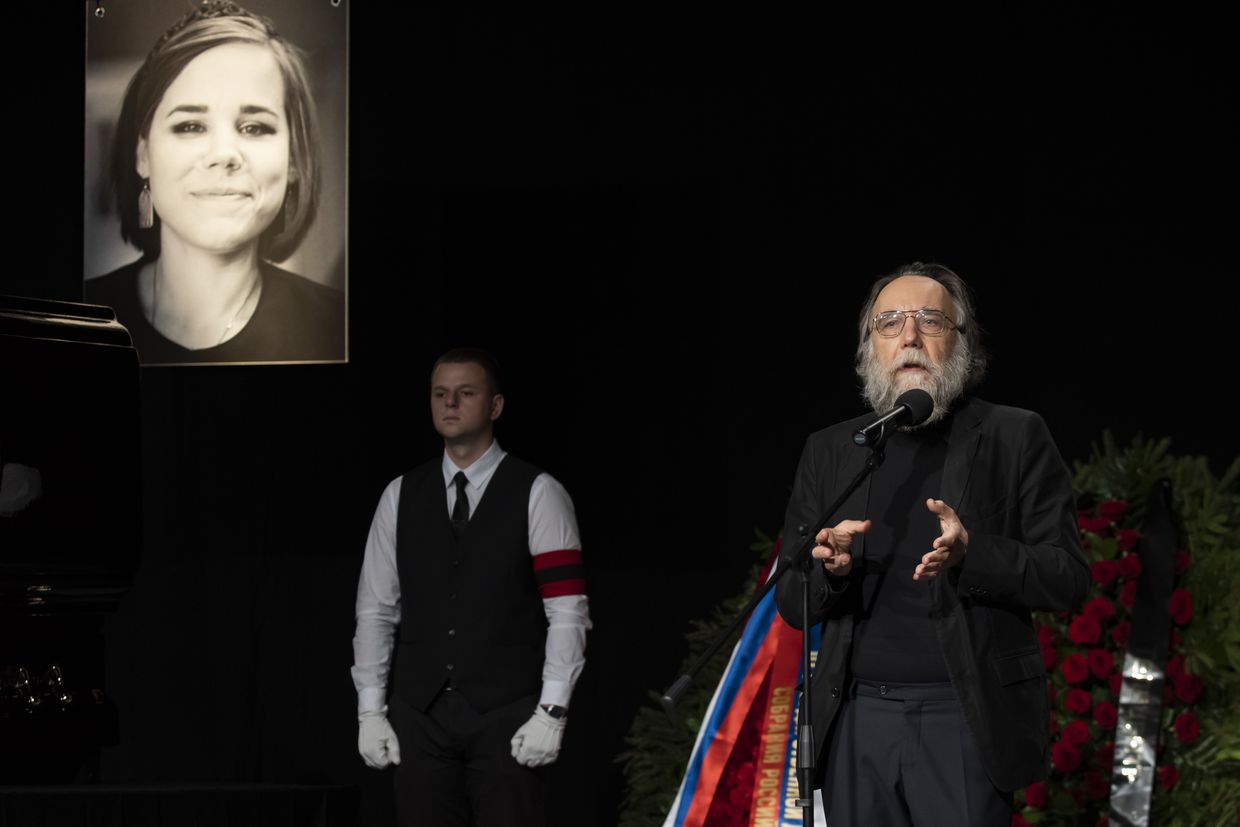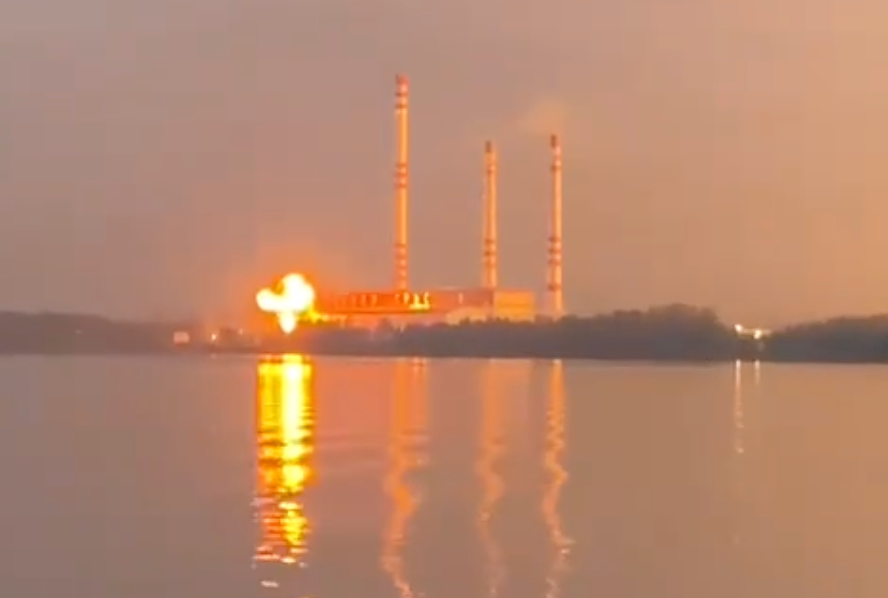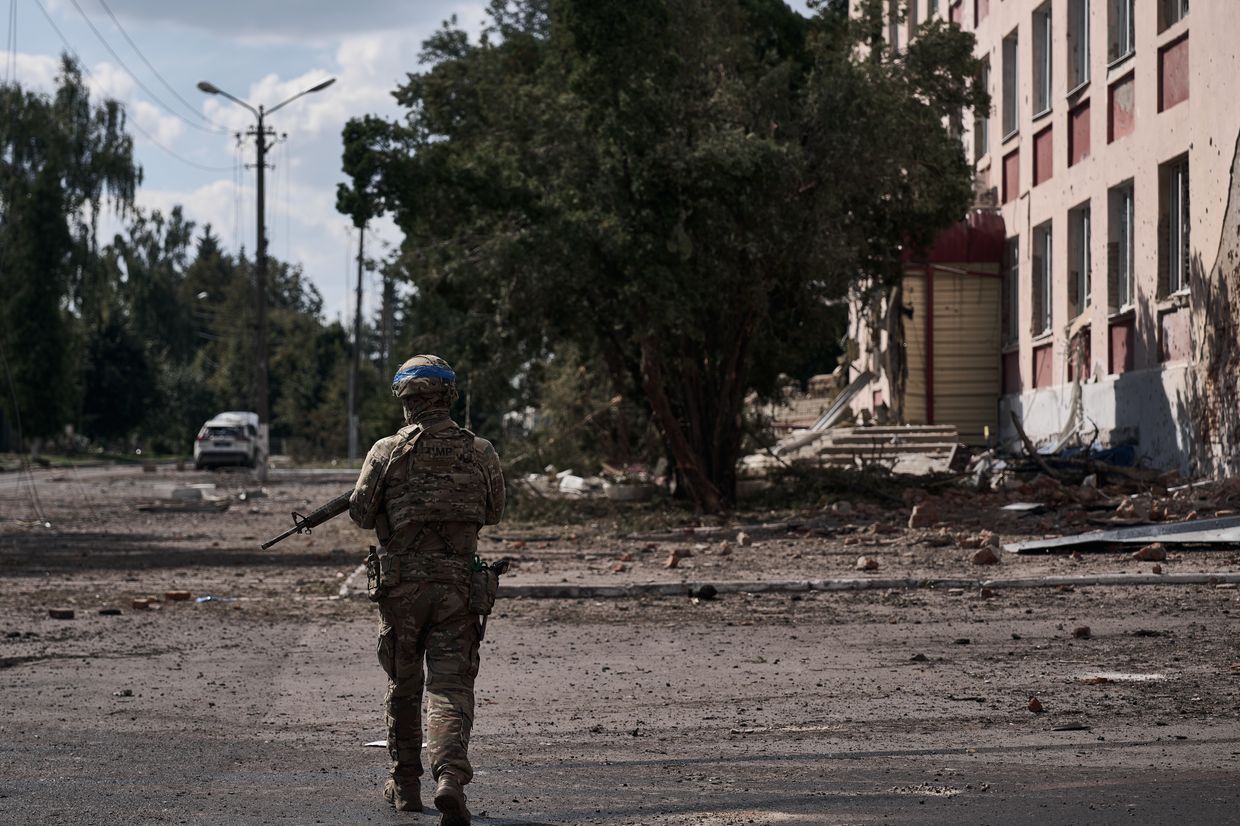Assassinations of pro-war figures seek to demoralize Russia, punish war criminals
Military officials, propagandists, and those seen as collaborators by Kyiv have been assassinated in Russia or the Ukrainian territories it occupies since the beginning of Russia's all-out war in 2022.

A view of the scene after Lt. Gen. Igor Kirillov, head of Russian Nuclear, Biological, and Chemical Defense Forces, and his assistant were killed in an explosion in Moscow, Russia on Dec. 17, 2024 (Sefa Karacan/Anadolu via Getty Images)
The Dec. 17 killing of Russian Lieutenant-General Igor Kirillov in Moscow — reportedly by the Security Service of Ukraine (SBU) — is the most high-profile assassination of a Russian military official to date.
It's not the first one, however.
Military officials, propagandists, and those seen as collaborators by Kyiv have been assassinated in Russia or the Ukrainian territories it occupies since the beginning of Russia's all-out war in 2022.
Analysts say that such assassinations aim to bring war to Russian territory, undermine the enemy's morale, and divert Russian troops and security personnel from the front line.
Another goal is to punish those accused of committing war crimes in Ukraine since it's impossible to use courts to bring them to justice, they add.

"These assassinations, particularly just a few kilometers away from the Kremlin, are a humiliation for (Russian President Vladimir) Putin as they demonstrate a failure of Russia's security agencies and that no one in the regime, civil or military, is safe," Jamie Shea, a defense and security analyst at Chatham House, told the Kyiv Independent.
James Nixey, director of the Russia and Eurasia program at Chatham House, told the Kyiv Independent that such assassinations "put the element of doubt into Russian generals" as "they are not safe either on the front line or in Moscow suburbs."
The Ukrainian authorities have not officially admitted their participation in the assassinations.
The SBU did not respond to a request for comment, while Ukraine's military intelligence (HUR) declined to comment.
Security failure
Most experts who talked to the Kyiv Independent believe Ukraine is indeed behind most of the assassinations of Russian military officials, propagandists, and those seen as collaborators by Kyiv.
"The fact that (Ukrainian) intelligence services can carry out such operations in Moscow severely undermines (Russia's) morale and combat readiness. Every such operation is a failure of their security architecture," Ukrainian military analyst Dmytro Zhmailo told the Kyiv Independent.
"It means they will keep more forces within Russia and move fewer troops to the occupied territories... It forces them to spend more money on security and take more actions — strengthening protocols, spending more money, moving more troops."
Erik Stijnman, a military expert at the Netherlands Institute of International Relations (Clingendael), said that "senior officials will increasingly feel that they also are not safe from the effects of the war."
"This can have a strong psychological effect on senior Russian leadership and alternatively give a morale boost to Ukrainian citizens," Stijnman told the Kyiv Independent.
"If this happens regularly, this may have an effect on the perceived effectiveness of the counterintelligence apparatus of the Russians. This may prove to be undesirable for the Kremlin, as it fears that opposition, in general, may rise when it is clear that the Russian intelligence community is also not omniscient."
Matthew Savill, director of military sciences at the Royal United Services Institute, said that such assassinations "are predominantly aimed at attacking aspects of the Russian military system while increasing the psychological pressure on Russia by bringing the war home to Russians."
"Organizations like the SBU and HUR want to demonstrate their reach and capabilities and divert Russian intelligence efforts into intensive counterintelligence operations on home soil," he told the Kyiv Independent.
Achieving justice
Another goal is "justice — showcasing that committing war crimes will have repercussions," Stijnman said.
"Those targeted by Ukraine's SBU are often war criminals who have been indicted by Ukraine's justice system and by other countries," Shea said. "This was the case with General Kirillov, for instance. These people, protected by Moscow, are unlikely to appear before the International Criminal Court in The Hague. So their killing is a form of justice, and very few will mourn their deaths."
Kirillov was the head of the Russian Nuclear, Biological, and Chemical Defense Forces. On Dec. 16, Kirillov was charged in absentia by the SBU for the use of banned chemical weapons in Ukraine.
But Kirillov is not the first suspected war criminal to be targeted.
In July 2023, Stanislav Rzhytskyi, a Russian Navy officer allegedly responsible for missile strikes against Ukrainian civilians, was shot dead in Krasnodar, Russia.
Ukrainian media reported that Rzhytskyi commanded the Krasnodar submarine, which launched Kalibr missiles against Vinnytsia on July 14, 2022, killing 27 civilians, including three children.
Another similar assassination took place in November 2024, when Russian Navy officer Valery Trankovsky was killed in occupied Sevastopol.

Russian Captain Valery Trankovsky. (SBU source)
Trankovsky was the chief of staff of the 41st Missile Boat Brigade and a "war criminal who has ordered cruise missile launches from the Black Sea against civilian sites in Ukraine," an SBU source told the Kyiv Independent.
He was also reportedly involved in the 2022 attack on Vinnytsia.
Yet another alleged war criminal, Sergei Yevsiukov, was killed in a car explosion in Russian-occupied Donetsk on Dec. 9, 2024.
Yevsiukov is a former head of Russia's Olenivka prisoner of war (POW) camp in the occupied part of Donetsk Oblast.
The Olenivka camp, notorious for the torture and abuse of Ukrainian captives, was hit by an explosion in June 2022, killing over 50 Ukrainian POWs and injuring more than 150. Kyiv called this a deliberate Russian war crime.
read also
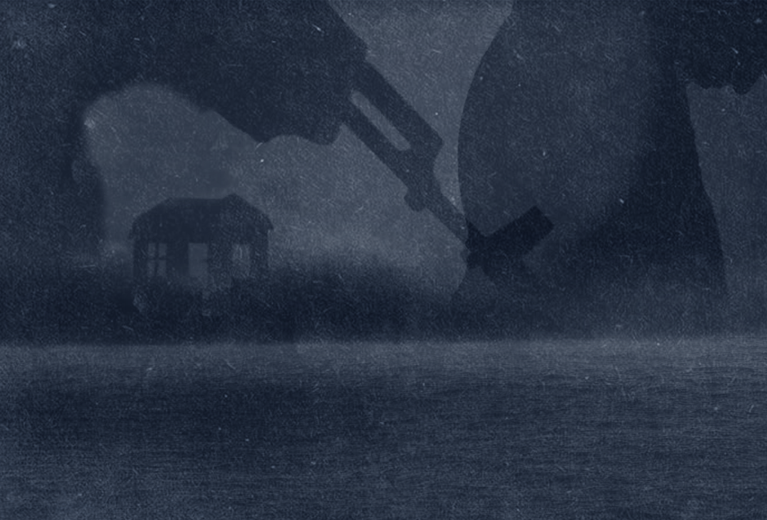
Are assassinations effective?
The effectiveness of assassinations for Ukraine's war effort is difficult to determine, analysts say.
"The question of their effectiveness is harder to discern: while we can expect there to be nervousness in parts of the Russian system as to the extent to which the Ukrainians are able to identify and surveil targets, even in Moscow, and then successfully launch attacks, it isn't clear if they are impeding the Russian war effort," Savill said.
"For example, the Ukrainians have publicly identified personnel they believe are involved in the long-range missile strikes, and last year assassinated a Russian navy officer involved. But these strikes have continued, mostly constrained by production problems rather than anything else."
Shea said that "an assassination even of an important military figure like Kirillov will not change the course of the war."
"Russia has hundreds of generals, as Putin has reminded us since his invasion of Ukraine by firing so many of them for corruption and incompetence," he added.
"But the targeted assassinations can disrupt Russia's war plans and command and control system even if only temporarily, and they can cause many Russians to question what Putin is doing in Ukraine and his failure to guarantee the safety of Russians, as he has always pledged to do. They also help to boost Ukrainian morale at a difficult time on the battlefield in the Donbas."
Stijnman also argued that "(assassinations) will most likely remain a supportive effect within the frame of the war, as the primary reason for this specific operations will instill a sense of justice to Ukraine, but will not directly contribute to the war effort."
Legitimate targets?
There is a consensus among experts that Kirillov and other Russian military officials are legitimate targets for Ukraine's special services.
"Kirillov was a legitimate military target, considering the activities he led and oversaw in his official capacity within the Russian military chain of command," Karolina Hird, an analyst at the Institute for the Study of War, told the Kyiv Independent.
"As head of the Russian Nuclear, Biological, and Chemical Defense Forces, Kirillov was personally responsible and oversaw the use of banned chemical weapons against Ukraine."
Savill also argued that "where these targets are part of the Russian military system or industrial production, they are legitimate targets," and "Kirillov clearly falls into that category."
Stijnman said that "the operation (against Kirillov) seems to have been conducted within the constraints of international humanitarian law, as the attack was discriminatory: the use of a camera to time the attack, thus avoiding collateral damage, indicates as much."
"It seems that the Ukrainian government understands that there is a limit to what actions will be deemed acceptable to the West in order to avoid a decrease in the support for the Ukrainian war effort," Stijnman added.
Shea said that "this practice is more justified, and justifiable, in wartime and in circumstances where the normal course of justice, trials for war crimes and massive human rights abuses, is unlikely to function because of the total non-cooperation and non-compliance of the country responsible, in this case, Russia."
"Russia attacked Ukraine, and Ukraine did nothing to provoke Moscow's aggression," he added. "So Kyiv is entitled to justify its targeted assassinations as legitimate self-defense."
Shea said that it's "noteworthy that Ukraine's targeted assassinations have not provoked criticism from Ukraine's principal supporters and providers of military assistance."
"It is accepted that, as long as the individuals targeted are directly involved in Russia's illegal aggression, this is one way that Ukraine can strike back at an aggressor who has committed thousands of war crimes against Ukraine, especially drone and missile attacks against civilians and civilian infrastructure," he added.
Controversy over other targets
However, there is a discussion on whether some other pro-war individuals, such as Russian collaborators and propagandists, constitute legitimate targets.
Collaborators have often been targeted since the invasion started.
In August 2022, Oleksiy Kovalyov, a former MP from President Volodymyr Zelensky's party who joined the Russian occupation authorities in his native Kherson Oblast, was shot dead in then-occupied Kherson.
Kirill Stremousov, a deputy head of Russia's illegal occupation government in Kherson Oblast, died in a car accident in November 2022. Atesh, a Ukrainian partisan group, claimed responsibility for his death.
In December 2023, Illia Kyva, a notorious Ukrainian lawmaker who sided with Russia, was killed in Moscow Oblast.

Russian propagandists were also targeted.
Russian pro-war propagandist Darya Dugina was killed in a car bombing near Moscow in August 2022. Dugina's father, the Russian ultranationalist Alexander Dugin, is currently wanted by the SBU for promoting genocide against Ukraine.
The Washington Post reported, citing its sources, that Dugina's assassination was conducted by the SBU, but her father was the intended target of the attack.

Another propagandist, war correspondent Vladlen Tatarsky, was killed in an explosion in a cafe in central St. Petersburg in April 2023. The blast injured 25 other people.
Savill said that "some previous operations have been more dubious in targeting and execution (than Kirillov's assassination)."
"For example, it is harder to make a case that Darya Dugina or Vladen Tatarsky were military targets, and in the case of the latter, he was killed by a bomb in a café full of civilians, allegedly delivered by an unwitting courier," he added.
Zhmailo disagreed, saying that "anyone even remotely connected to the war is a legitimate target."
"The people (that Ukraine) has (allegedly) targeted have all been implicated in Russia's illegal war effort, either as military commanders (using illegal tactics such as chemical weapons or the massacres of civilians in violation of the Geneva Conventions), involved in the illegal occupation of sovereign Ukrainian territory, or acting as propagandists for the regime in spreading lies and misinformation," Shea said. "So they can be classified as enemy combatants."
However, such operations could jeopardize Western support in the future, according to Stijnman.
"The more Ukraine will struggle on the battlefield, the more Ukraine may feel the need to continue to counter the Russian threat via such (methods) but ever more via unconventional means," he said.
"The danger is, of course, that the size and scope of these efforts will increasingly create friction with international humanitarian law, possibly degrading Western support... Ukraine will need to walk a tightrope here."

